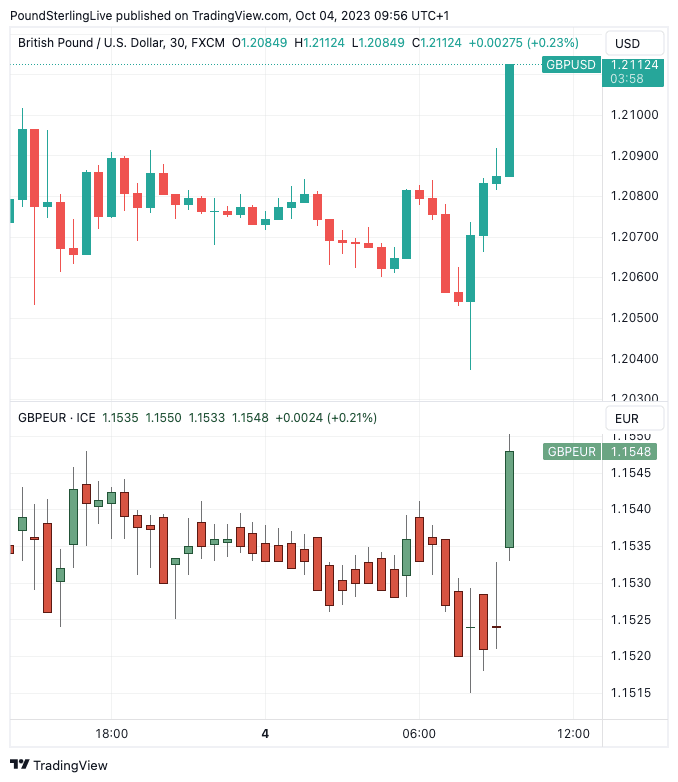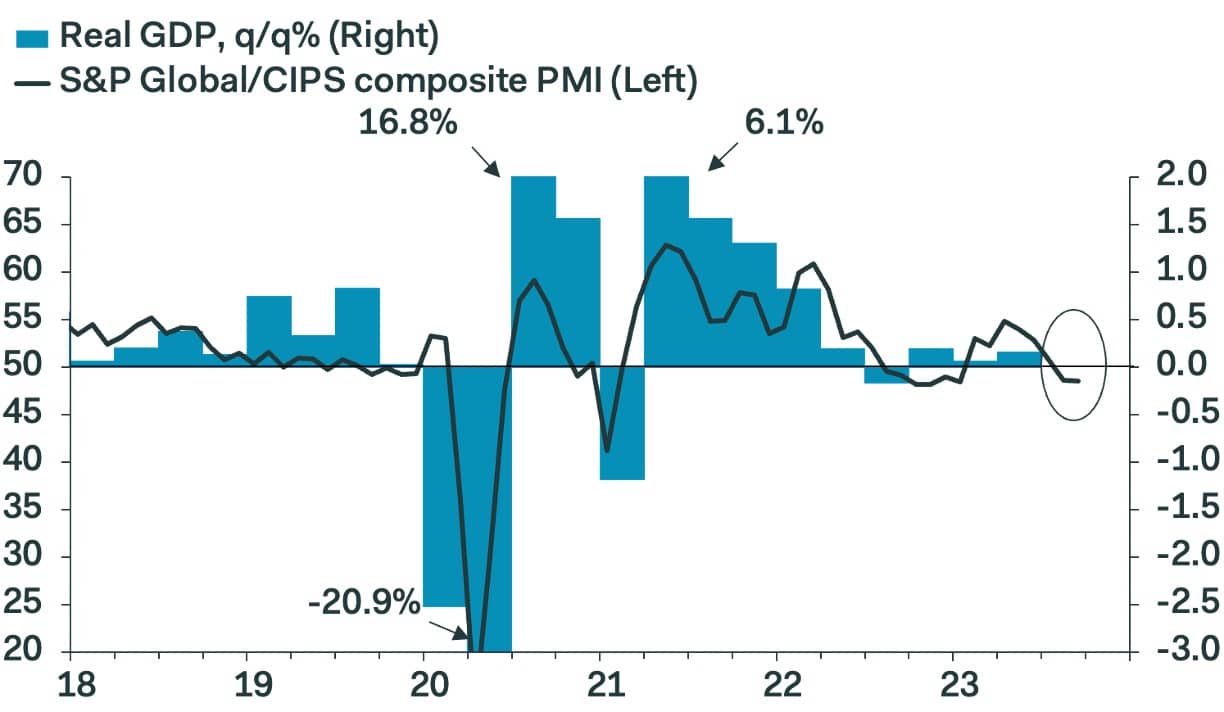Pound Rises on Upward Revision to September's PMI Data
- Written by: Gary Howes

Image © Adobe Stock
There was a small, albeit clear, rise in the value of the Pound against the Euro and Dollar following the announcement of a sizeable upgrade to the UK's PMIs for September, which suggests the economy did not fare as poorly as previously thought.
The S&P Global Services PMI for September was upgraded to 49.3, from 47.2 in the first estimate and suggests the economy avoided a notable downturn but instead moved sideways from August's print of 49.5.
The rapid deceleration implied by the preliminary estimate's release was attributed to an extension of the Pound's multi-week decline at the time. Wednesday's upside surprise can therefore be considered supportive of the currency.
The GBP to EUR conversion rose 0.20% in the 30-minute window following the data's release to quote at 1.1550. The GBP to USD conversion was higher by a similar amount at 1.21.
Compare Currency Exchange Rates
Find out how much you could save on your international transfer
Estimated saving compared to high street banks:
£2,500.00
Free • No obligation • Takes 2 minutes
The Composite PMI, which adjusts the services, construction and manufacturing PMIs to give a more accurate snapshot of the broader economy, was revised higher to 48.5 from 46.8 in the first estimate.
The data therefore suggests a mild contraction in the UK economy given the readings are still below 50.
But the upgrade is significant because the deeper slowdown implied by the preliminary estimate is suspected to have been a key reason behind the Bank of England's decision to keep interest rates unchanged in September, given the Monetary Policy Committee had advanced sight of the report.
The updated report nevertheless confirms the UK labour market is loosening in a fashion that the Bank will feel justifies their decision to pause as it was noted companies reported their fastest rate of job shedding since January 2021.
And, inflationary pressures are reported to be at their lowest for almost two-and-a-half years according to S&P Global, compilers of the PMI report.
Above: GBPUSD (top) and GBPEUR at 30-minute intervals showing a clear reaction to the PMI data release.
A current thesis behind forecasts for a lower Pound over the coming months - see our coverage of calls by JP Morgan, Goldman Sachs and Morgan Stanley - is that the UK economy is to decelerate notably over the coming months.
Indeed, the Q4 forecast we have just published covering City Index's expectations reflects this theme to be widespread amongst currency watchers.
However, we take note of other survey data on business confidence and consumer confidence that are not consistent with such dour expectations. Indeed, the revisions from S&P Global mean the PMI is now more aligned with these more optimistic surveys.
"The composite PMI is no longer an implausible outlier, after the sharp upward revision to the flash estimate," says Samuel Tombs, Chief UK Economist at Pantheon Macroeconomics.
The PMI survey noted that "business activity expectations for the year ahead remained optimistic overall and edged up to a three-month high in September."
Around 50% of the survey panel predict an increase in activity levels over the next 12 months, while only 14% anticipate a decline.
"The future output index of the composite survey edged up to 69.0 in September, from 68.9 in August, and so remained slightly above its 2012-to-2019 average, 68.2. The recent resilience of other business surveys, such as the one conducted by Lloyds, and the recovery in GfK’s composite index of consumer confidence, also suggest that a recession is not underway," says Tombs.
Above: The PMI data hint at a slight economic contraction in Q3, but Pantheon Macroeconomics notes the PMI has often underestimated growth.
Positive sentiment was attributed to hopes of a sustained easing of inflationary pressures and a turnaround in customer demand, as well as new product launches and business investment plans.
Businesses nevertheless remain concerned about the higher interest rate environment and stretched household budgets.
Inflationary pressures remain elevated with average prices charged by service sector companies continuing to rise at a robust pace in September, largely reflecting efforts to pass on higher operating expenses.
A number of firms cited fuel surcharges and the impact of rising wage bills.
"However, mirroring the trend for input costs, the rate of prices charged inflation eased again in September and was the weakest for 29 months. Service providers commented on greater competitive pressures and some suggested that lower demand had encouraged price discounting strategies to stimulate sales," reports S&P Global.
This will be welcomed by the Bank of England which is betting services inflation - something it has been particularly concerned about - will fall sharply over the coming months.
The findings suggest a lower inflation environment that is accompanied by a robust activity outlook, which is overall supportive of the Pound.
Compare Currency Exchange Rates
Find out how much you could save on your international transfer
Estimated saving compared to high street banks:
£2,500.00
Free • No obligation • Takes 2 minutes






